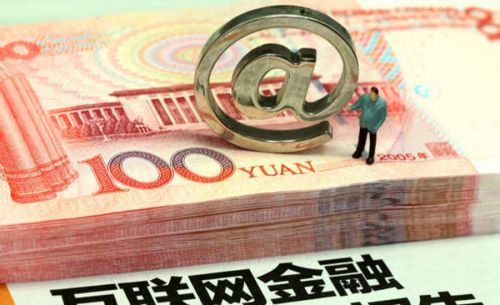
|
China's brick-and-mortar banks are launching a counter-attack against the assault on their business from Alibaba and other Internet heavyweights, in a bid to staunch the outflow of bank deposits into high-yielding online investment products. In less than eight months, Alibaba Group Holding Ltd's money market fund, Yu'e Bao, has attracted 400 billion yuan ($66.0 billion) in assets under management, more than the customer deposits held by the five smallest listed Chinese banks. Similar online products from Baidu Inc and Tencent Holdings Ltd also contributed to a fall of one trillion yuan in traditional bank deposits in January. "Yu'e Bao and similar products are posing a very strong competitive challenge to banks," said Zennon Kapron, head of Kapronasia, a finance and technology consultancy based in Hong Kong. "Although the amount of money that (online products) have attracted is still small as a portion of banks' overall deposit base, it's very significant in terms of the speed at which they've grown." Now traditional lenders, initially caught flat-footed, are striking back. Industrial and Commercial Bank of China , Bank of China , Bank of Communications and Ping An Bank have all launched new products in recent weeks that match the attractive features of Yu'e Bao. Banks are also lobbying regulators to introduce curbs on the growth of on-line funds offered by non-banks. Ultimately, however, competition for deposits will drive up banks' funding costs and crimp profit margins this year. As China gradually moves to liberalize deposit interest rates, banks will be forced to compete among themselves to attract customers, which means offering higher yields. The development of new deposit-like money market products designed to compete with online rivals will further accelerate the trend toward higher funding costs. "It's going to negatively affect bank margins. Costs will go up," said May Yan, Asia ex-Japan banks analyst at Barclays Capital in Hong Kong. CASH ON DEMAND Chinese savers in recent years have flocked to so-called wealth management products (WMPs) that banks market as a higher-yielding alternative to traditional savings deposits, which remain subject to a cap of 3.3 percent for one-year savings. Alibaba super-charged the switch away from traditional deposits last June when it launched Yu'e Bao in partnership with Tianhong Asset Management Co Ltd, in which it owns a 51 percent stake. The product is currently yielding 6.2 percent. Beyond the attractive yield, several innovations allowed Yu'e Bao and other online money-market funds to draw funds away from bank deposits and offline WMPs. Unlike most bank WMPs, the Yu'e Bao fund allows investors to redeem shares for cash at any time, rather than locking up their funds for months at a time. Yu'e Bao also requires no minimum threshold to buy in. The product's seamless integration with Alibaba's widely used third-party payments platform, Alipay, also makes buying into the product simple and convenient. Now banks are getting in on the act with their own cash-on-demand money market products. ICBC, the world's largest bank by assets, launched a money-market WMP called "Tiantian Yi, which translates as "Everyday Benefit." So far only account holders based in the eastern province of Zhejiang are allowed to purchase, but the pilot is likely to ramp up quickly. ICBC hopes to gain an edge over Alibaba by allowing customers to transfer up to 30 million yuan into its product, known as "Everyday Increase." ICBC has also fought back by limiting its depositors monthly transfers to Alipay to 50,000 yuan per month. Bocom, China's fifth largest lender, has launched "Quick Benefit Channel," while Ping An Bank has a product called "Ping An Profit." Bank of Beijing Co Ltd , a mid-sized lender, on Wednesday announced a partnership with smartphone maker Xiaomi Tech on mobile payments and sales of WMPs and insurance products. Banks are also tweaking WMPs to make them more competitive. "We're trying to increase the convenience of our WMPs, like letting people buy them during non-working hours. We're also asking the bank regulator to let us lower the 50,000 yuan minimum investment for some products," said a wealth product manager at a mid-sized bank in Shanghai. CALLS FOR REGULATION UBS estimates that if 10 percent of total bank deposits flow into online products, it could reduce banks' net interest margin by 0.1 percentage points, while lost fee income would amount to 4 percent of estimated 2014 net profit. The China Securities Regulatory Commission said last week that it is working with other agencies to develop rules for Internet finance. Industry observers say that banks are lobbying for curbs on the proliferation of online products from third-party payment services. "Regulators are trying to walk a fine line. They don't want to kill innovation that benefits consumers, but they also don't want deposit-taking activity that's completely unregulated," said Yan. Analysts say that even if banks are able to draw funds into their own money-market products the trend of rising funding costs will continue, as the banks' products would have to match the yields offered by online rivals. Indeed, funds invested in Yu'e Bao and similar products eventually end up with banks anyway. Tianhong uses Yu'e Bao funds to invest mainly in interbank deposits and repurchase agreements. So whether banks borrow from Tianhong or raise funds from their own products, the cost is still higher than on ordinary deposits. "The money stays in the system, but (online products) turn cheap deposits into expensive ones," said May Yan, Asia ex-Japan banks analyst at Barclays Capital in Hong Kong. ($1 = 6.0641 Chinese yuan) |
据路透社报道,为了应对来自阿里巴巴及其他互联网巨头对中国传统银行业务的影响,中国传统银行正发起反击,旨在阻止银行存款外流到高收益率的互联网投资产品。 还不到八个月,阿里巴巴集团旗下的货币市场基金产品--余额宝总共吸收了4000亿元(约660亿美元),超过了5家中国最小规模上市银行的客户存款总和。 百度公司及腾讯控股有限公司旗下类似的互联网产品也是一月份中国传统银行存款流失一万亿元的原因。 香港一家金融技术咨询公司Kapronasia的负责人Zennon Kapron表示:“余额宝及其他类似的互联网产品正对中国传统银行发起一股强有力的挑战,尽管这类互联网产品吸收的资金总量与银行存款总额相比仍然不大,但是其增长速度是相当惊人的。” 如今,措手不及的传统银行正开始反击。 最近几周,中国工商银行,中国银行,交通银行及平安银行全都推出了新的产品,对抗余额宝。 银行还在游说监管部门采取措施,控制互联网产品的发展。 然而,最终各类产品对存款的竞争将会提高银行今年的融资成本,降低其利润空间。 随着存款利率不断地自由化,中国传统银行将会被迫进行内部竞争,提供更高回报率的产品,吸引客户。 旨在与互联网产品对抗的新型类存款资金市场产品将会进一步加速融资成本的增大。 前日本银行亚洲分析师,香港巴克莱资本的May Yan表示:“这样一来,银行利润率将会受到不利影响,成本将上涨。” 现钱交易 近年来,中国储户热捧银行所谓高回报率的理财产品(WMPs),并从传统年利率上线为3.3%的储户存款中解放出来。 去年六月,阿里巴巴与天弘资产管理有限公司携手发行余额宝,就完全主导着银行传统存款的外流。阿里巴巴持有天弘资产管理有限公司51%的股份,该产品目前的年化收益率为6.2%。 余额宝及其他互联网货币市场基金之所以能够从传统的银行存款及线下理财产品中吸收资金,除了诱人的高回报外,还得益于其几项创新改革。与大多数银行理财产品不同的是,余额宝允许投资者随时赎回资金,而不是一次就锁定他们的资金好几个月。而且余额宝没有设置最低投资门槛。 余额宝与支付宝(阿里巴巴旗下被广泛使用的第三方支付平台)的完美结合,也使得购入该产品更为简单方便。 现在,各银行都行动起来,推出各自现钱交易的资金市场产品。 世界上资产总量最大的银行--中国工商银行,发行了资金市场理财产品--“天天益”。目前只有浙江地区的储户才能购买天天益,但是工商银行将有可能很快地扩大其试点范围。 工商银行希望赢得与阿里巴巴竞争的优势,借“天天益”吸收存款达3000万元。 另外,工商银行还规定,储户每月向支付宝转账的金额不得超过5万元。 中国的第五大商业银行--交通银行,推出了“快溢通”,平安银行则推出了“平安盈”。 周三,中等规模的北京银行宣布与智能手机生产商小米科技建立合作伙伴关系,合作范围涉及移动支付及销售理财产品和保险产品。 银行也正对各自理财产品作调整,使其更具竞争力。 上海一家中等规模银行的理财产品经理表示:“我们正试图增加我们理财产品的便利性,比如说:在非工作时段让客户购买我们的产品。我们也在要求监管部门放宽某些产品5万元的投资门槛。” 要求监管 瑞士联合银行预计,如果银行总存款的10%流入互联网产品,那么银行的净利差可能减少0.1个百分点,同时手续费收入将会损失高达2014年预计净利润的4%。 上周,中国证监会表示他们正与其他部门就互联网融资制定相关规则。业内观察家们表示各银行正在游说监管部门,从第三方支付服务方面阻止互联网产品的扩张。 Yan 表示:“监管部门正试图找出个折中的办法。他们不想扼杀一切有利于消费者的改革创新,但是他们也不想融资活动处于完全不被监管的状态。” 分析师表示即使银行有能力吸引资金投资他们的货币市场产品,融资的成本增加的趋势还会继续,因为银行产品将不得不与由互联网竞争对手提供的高回报产品进行抵抗。 的确,投资在余额宝及其他类似产品的资金最终会流向银行。天弘主要把余额宝资金投入到同业存款及回购上。因此,不管银行是向天弘借贷,还是从自己的产品中融资,成本仍旧比普通存款高。 前日本银行亚洲分析师,巴克莱银行的May Yan表示:“虽然资金还在银行系统里,但是互联网产品将廉价存款的成本提高。”(1美元=6.0641元) 相关阅读 (译者 Chinsane 编辑 王辉) |
